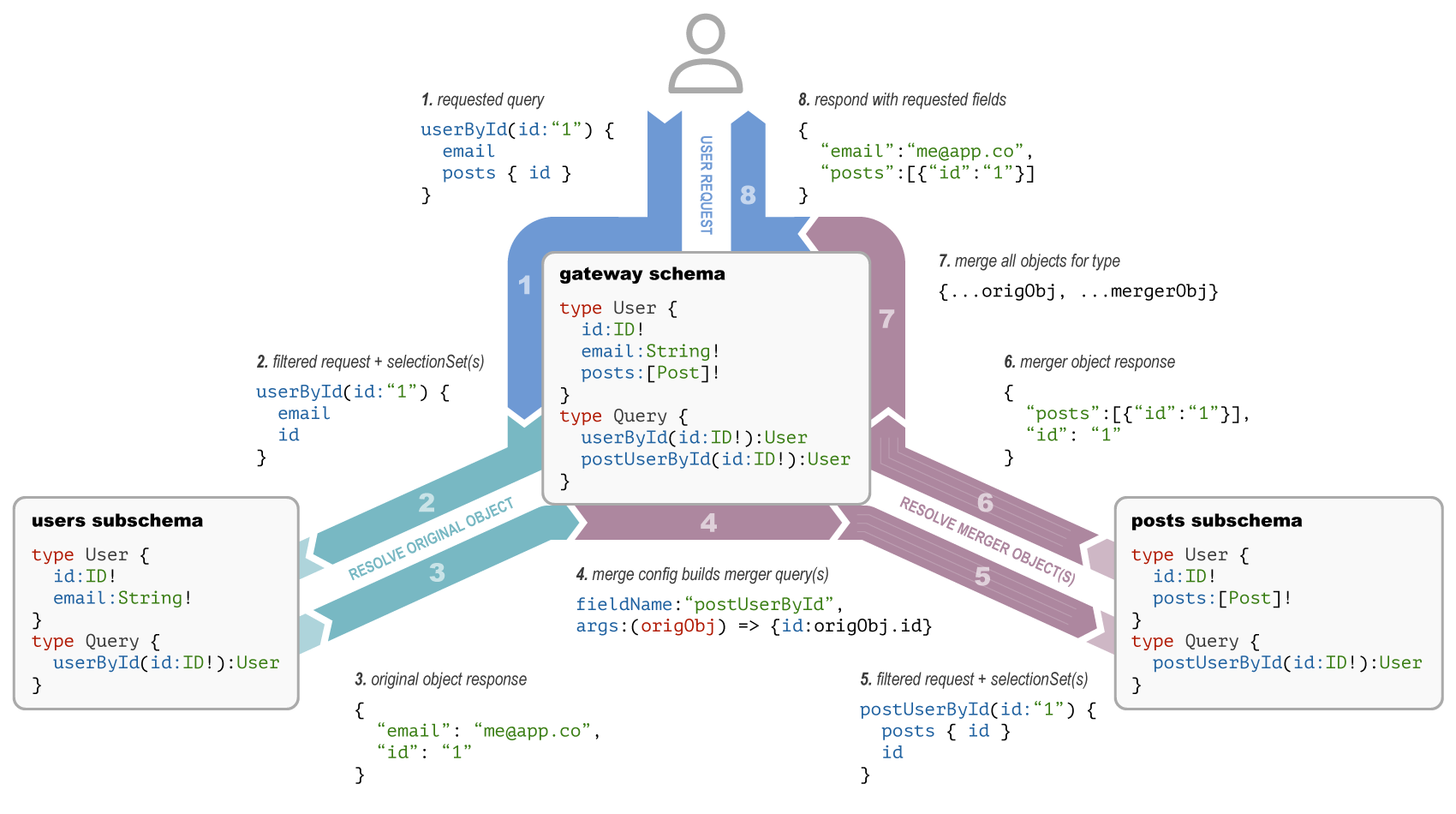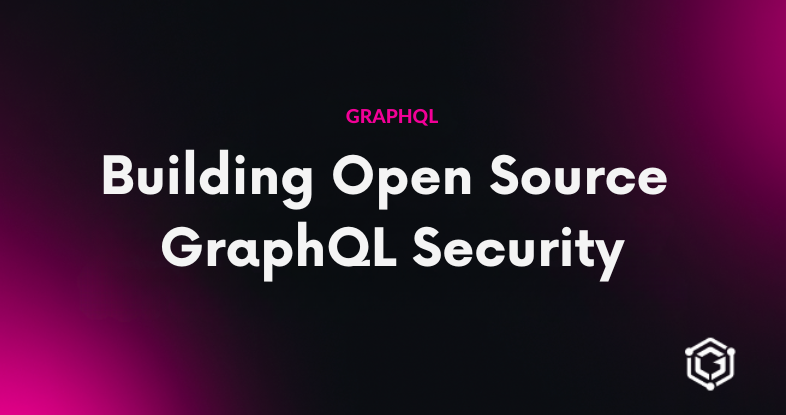GraphQL Tools V8 - Stitch Federation Services
Ever since The Guild has taken over GraphQL Tools, we kept our promise and like every open source library we maintain, we keep improving and supporting it on a daily basis.
Many things are continuously happening and improving with the library, and now, as we are releasing a new major version, we wanted to share some new things we’ve added.
It’s important for us to say thank you to all our users and open source contributors. The driving force behind this tremendous amount of work is you!
TL;DR
- We significantly improved GraphQL Stitching Performance
- You can now manage Apollo Federation services using Schema Stitching Gateway
- You can consume Relay services in the Gateway
- We support upcoming graphql-js features like
@deferand@stream - Many more improvements in the release notes
Faster Schema Stitching
We heavily worked on improving the performance of Schema Stitching by refactoring some parts of the query planner, schema delegation and more. So we got much better performance than before. Please check the release notes to make sure you are good to start using v8 to benefit from all these improvements!
More Flexible Schema Stitching
The modern Schema Stitching is fairly comparable to Apollo Federation with automated query planning, merged types, and declarative schema directives.
But it is also more configurable. You can configure your gateway and services in service level using Stitching Directives or in the gateway level using Type Merging configuration.
Manage Apollo Federation Services with Schema Stitching Gateway
You can even consume your existing Apollo Federation services inside Schema Stitching without any
changes by using the federationToStitchingSDL utility function from
@graphql-tools/stitching-directives. Please check the Stitching Handbook to learn more.
Federation Services - Stitching Handbook
Relay-Based Gateway Possible?
If you have multiple services using
Relay Specification, you can
easily combine them with the handleRelaySubschemas utility function from @graphql-tools/stitch
package, and your unified schema will handle Node interface and node operation automatically
using Type Merging.
You can check the unit tests to see the complete usage
It is pretty new, and we will improve the documentation for this use case gradually.
What Is Type Merging?
Type merging allows partial definitions of a type to exist in any subschema, all of which are merged into one unified type in the gateway schema. When querying for a merged type, the gateway smartly delegates portions of a request to each relevant subschema in dependency order, and then combines all results for the final return.
Type merging is now the preferred method of including GraphQL types across subschemas, replacing the need for schema extensions (though does not preclude their use). To migrate from schema extensions, simply enable type merging and then start replacing extensions one by one with merges.

Check out our documentation and stitching handbook to learn more about Type Merging!
Also, please watch this great presentation from Greg MacWilliam!
Future-Proof Schema Delegation
GraphQL Tools v8 is getting prepared for incoming GraphQL-js features. With defer and stream,
GraphQL execution will return Async Iterables even for query and mutation operations like
subscription ones. So we decided to remove Subscriber because we will need to handle Async
Iterables in Executor eventually.
You can easily merge your existing Executor and Subscriber functions by checking the
operationType of ExecutionParams;
function myExecutor({ document, variables, operationType }) {
if (operationType === 'subscription') {
return callWSClient(...);
}
return callHTTPClient(...);
}Create GraphQLSchema Instances for Your Remote APIs
URL Loader from @graphql-tools/url-loader package creates executable GraphQLSchema instances for
you to call your remote GraphQL APIs by using different protocols;
- Server Sent Events ✔️
- New GraphQL-WS ✔️
- Legacy subscriptions-transport-ws ✔️
- Multipart File Uploads ✔️
import { loadSchema } from '@graphql-tools/load'
import { UrlLoader } from '@graphql-tools/url-loader'
const schema = await loadSchema(`https://my-graphql-api.com`, {
loaders: [new UrlLoader()],
// Enable File Uploads
multipart: true,
// Choose your Subscription protocol
subscriptionProtocol: SubscriptionProtocol.SSE
})Create Executors for Schema Stitching / Delegation
You can easily create executors for subschemas like below:
import { stitchSchemas } from '@graphql-tools/stitch'
import { UrlLoader } from '@graphql-tools/url-loader'
import { introspectSchema } from '@graphql-tools/wrap'
const urlLoader = new UrlLoader()
const executor = urlLoader.getExecutorAsync(`https://my-graphql-api.com`, {})
const mySubschema = {
schema: await introspectSchema(executor),
executor
}
const stitchedSchema = await stitchSchemas([mySubschema, myOtherSubschema])And More…
- Git Loader now supports glob patterns
- GraphQL Tools is used by GraphQL Config, GraphQL Code Generator, GraphQL Inspector and more to download the type definitions and operation documents from the different sources with GraphQL Tools Loaders.
- For example to compare your schema against the master, you need to dump your schema into a
single “schema.graphql” file and point the GraphQL Inspector to that file. But now you can use
glob patterns to point multiple files on your Git repo, and you don’t need to have a generated
schema.graphqlin the codebase.
- No more a huge
graphql-toolspackage;- GraphQL Tools has a lot of packages for different use cases and previously we were publishing
graphql-toolspackage to the npm that includes all scoped packages we have in the repo. Let’s say when someone only needsmakeExecutableSchema, NPM installs every single package with a lot of unused dependencies together with those. From now on, we decided to deprecategraphql-toolsand encourage the users to migrate to the scoped packages. For example, you should install@graphql-tools/schemaformakeExecutableSchema. You can check API Reference and the rest of the documentation to find what packages you need.
- GraphQL Tools has a lot of packages for different use cases and previously we were publishing
- We have removed some functions, methods and stuff that are not widely used by the community;
makeRemoteExecutableSchema- In the new GraphQL Tools, you don’t need this at all. You can write your own executor by following the documentation and use wrapSchema instead. Or you can use UrlLoader directly without the need of writing all the remote execution logic.
- This was already being deprecated after v4 in favor of
wrapSchema. You can find the new usage in the docs.
- Legacy Schema Directives,
visitSchemaanddirectiveResolvers - And there are some other utility functions you might have been using from GraphQL Tools. You can check CHANGELOG to see rest of them.
Join our newsletter
Want to hear from us when there's something new? Sign up and stay up to date!
By subscribing, you agree with Beehiiv’s Terms of Service and Privacy Policy.
Recent issues of our newsletterSimilar articles

Announcing Accounts.js 1.0 Release Candidate
Introducing Accounts.js 1.0 Release Candidate, an end to end authentication and accounts management solution.

Building Open Source GraphQL Security
Learn how open-source boosts GraphQL security and explore defensive and offensive tools, resources, and best practices to protect your GraphQL APIs.

Open Source composition and validation library for Apollo Federation
Introducing MIT licensed drop-in replacement for the Apollo Federation composition library.

GraphQLConf 2023 Recap
Explore the highlights of GraphQLConf 2023. Learn about the latest trends in GraphQL, from gateway solutions to composite schemas and innovative projects.